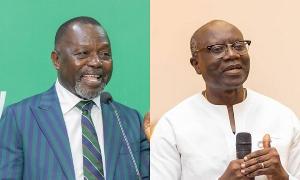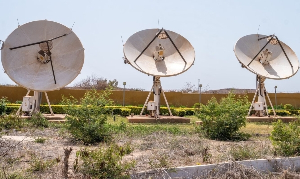(The Crusading Guide) -- Prof E.V.O. Dankwa, Counsel for Tsatsu Tsikata, former Ghana National Petroleum Corporation (GNPC) Chief Executive, has insisted that there is nothing under the 1992 constitution known as the ‘Fast Track’ Court.
Speaking in an interview on Joy FM, an Accra based radio station ‘Super Morning Show’ programme, Prof Dankwa said under Article 3 of the Transitional Provision, “the Supreme Court, the Court of Appeal and the High Court in existence immediately before the coming into force of this Constitution shall be deemed to have been established under this constitution and shall perform the functions of the Supreme Court, the Court of Appeal and the High Court specified respectively in Chapter II of this Constitution.
He emphasized that “there was no ‘Fast Track’ Court.” Prof Dankwa conceded the fact that Parliament gives power for the creation of lower courts and as a result, Parliament had caused to be established Circuit Tribunals, Circuit Courts, Community Tribunals, among others. “Nowhere do we find a court known as ‘Fast Track’ Court that had been created by Parliament and so we asked ourselves, “what is this,” he underscored.
Referring to an alleged claim by the Attorney General that the ‘Fast Track’ court is a division of the High Court, Tsatsu’s counsel contended that, “if it is a division then it must be created in accordance with the provision of the Constitution on the establishment of the High Court.” He said that provision requires the Chief Justice to create the division of the High court and that the judges of such division must be known. “We must also know the subject area,” he insisted.
Prof. Dankwa made reference to a document from the Attorney General’s outfit which he observed, had only civil cases listed in it. “There is nowhere you could find that so-called division could try criminal cases”, he underscored, adding, “In any case, it is not even a document by the Chief Justice; it is a document with the Forward written by the Chief Justice and the content was written by other persons,” Prof Dankwa observed.
He stressed that the power of the Chief Justice to set up a division of the High Court is nothing he can delegate to other people “and so that is where it needs constitutional requirement.” When the station pressed further for him to substantiate his assertion that the document was written by other people, Tsatsu’s solicitor mentioned Brobbey and Ainuson.
Asked to differentiate between the ‘Fast Track’ High Court and the normal High Court as he said, with the common argument being that it is just mechanisation, Pro Dankwa said it was on the basis of the claim that it is a division of the High Court that he raised the question that “we don’t find it in the Constitution; we don’t find it in the legislation and we are told that it is a division.”
Komla Dumor, the host, further probed, “Now, the Supreme Court upheld your view and position but I believe as a practitioner, aren’t you concerned about the avalanche of cases set back by the decision?” In his reply, the solicitor quipped, “Will it not be better to deal with the consequence of those cases now than to wait until ten years, eight years, 12 years, for someone to come and say aah! What is this?”
To another question, Prof Dankwa said after the Supreme Court ruling, the case was pursued at the High Court the day after and again they raised a preliminary objection to the prosecution at that stage “because again, the charge is unconstitutional.” Expatiating further on this contention, Dankwa sited Article 19 Clause 5 of the 1992 Constitution, which states, “A person charged with a criminal offence shall be given adequate time and facilities for the preparation of his defence.
He explained that Tsikata was being charged for something he is said to have done in February 1993 when the law under which he has been charged was not yet into being. When told that some people had observed that he had been running circles around the Attorney General’s Department, Prof Dankwa intimated that he did not know how the A-G’s Department was run and could not really say that he met that description at all.
“I am a law teacher here (University of Ghana) and defending a client I have known for years and I put it that way that some consequences may flow from the defence of the client. But my main objective is to protect the integrity of the Constitution, after that is the interest of my client. The consequences which flow from the defence I put up for my client are consequences people affected should try and deal with,” he stressed.
Asked whether he is confident of the outcome of the review, which the government is asking for, Prof Dankwa said he did not see the need for a review. Tsatsu Tsikata had been charged with willfully causing financial loss to the State.
Editorial News of Thursday, 7 March 2002
Source: --











